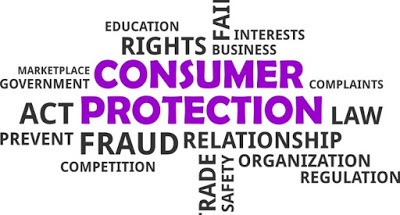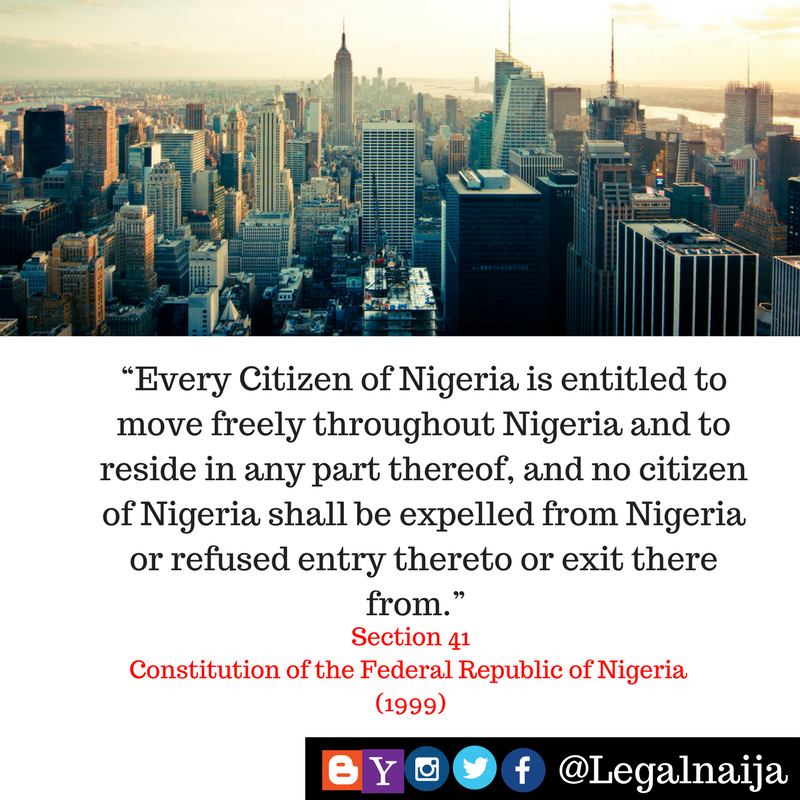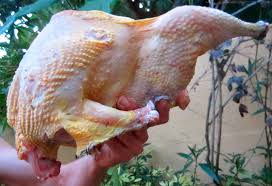
Consumer Rights Protection And The Nigerian State | Ahmed Adetola-Kazeem

Adetola-Kazeem, MCIArb (UK) at alecture organized by the Nigeria
Association of Muslim Law Students (NAMLAS) Olabisi Onabanjo University chapter
in honour of Hon. Justice M. O Abimbola, Chief Judge of Oyo State.
Oyebanji in suit no. LD/13/2008- Adebo Holdings Ltd
&Anor v. Nigerian Bottling CompanyPlc&Anor, has brought to
the fore Nigeria’s lackadaisical attitude towards the protection of consumers
just as it is in other facet of its national life.
defines a consumer as a person who buys goods or services for personal, family
or household use, with no intention of resale; a natural person who uses
product for personal rather than business purposes. A consumer has been defined
by the Consumer Protection Council Act, CAP C25 Laws of the Federation, 2004 as
an individual who purchases, uses, maintains or disposes of products or
services.
NIGERIAN BOTTLING COMPANYPLC&ANOR REVISITED
Ltd & Anor v. Nigerian Bottling Company Plc & Anor that
high levels of benzoic acid and sunset additives in the coca-cola products
could pose a health risk to consumers when mixed with ascorbic acid, commonly
known as vitamin C.
Nigerian Bottling Company (NBC) to place written warnings on Fanta and Sprite
bottles against drinking them with vitamin C, and awarded costs of two million
naira ($6,350) against the National Agency For Food and Drug Administration and
Control (NAFDAC) for failing to ensure health standards.
NAFDAC has been grossly irresponsible in its regulatory duties to the consumers
of Fanta and Sprite manufactured by Nigeria Bottling Company, NAFDAC has failed
the citizens of this great nation by its certification as satisfactory for
human consumption products which become poisonous in the presence of ascorbic
acid.”
the filing of the action against NBC and NAFDAC was given by Dr. Fijabi Adebo
in an interview granted to Punch Newspaper on the 26th of March 2017[1]. He said,
that the products our trading company, EFAD Limited brought into the UK were
fake and unsafe for human consumption which made the UK Customs and Excise to
act by destroying the products, we had to query the NAFDAC which plays
supervisory roles in safeguarding public health as an agency of the Federal
Government. We had to ask what it was doing when products unfit for human
consumption were being manufactured in the country. That was why we joined them
in the suit. In fact, our initial prayer was to stop the production of Fanta
with sunset yellow because it really alarmed us and according to the UK
findings, it could cause injury to children and others. Justice Taiwo in 2009
ruled that NAFDAC should go to the premises of NBC and make it reduce the
content of sunset yellow in Fanta. They obeyed the order and reduced the
content considerably. Before then, you would notice that whenever children
drank Fanta, their tongue would be yellowish. If they knew that it was not
injurious to consumers’ health, why did they reduce the sunset yellow? After
that, we got another ruling against NAFDAC compelling it to henceforth do
things right after being negligent by allowing manufacturers do things their
way. It was after we concluded those ones that we faced Coca Cola. Our lawyers
wrote them and they were so arrogant. They were not interested in our loss as a
customer who bought products from them. Their response to our lawyers was a
little less insulting. We then thought that if we had been so badly treated in
England on issue that was a fault of a manufacturer in Nigeria, I would not
come to my country and be so treated. I therefore swore to pursue the case
until justice was served.”
got rulings compelling the NBC to reduce the sunset yellow in Fanta and make
NAFDAC responsible in discharging its responsibilities. I also got an order for
the continuous monitoring of the content of Coca Cola products. The rulings
were satisfying to me. At the time we got the rulings, one would have
expected them to act in a normal, serious and corporate manner. But all we got
was that we did not tell them we were taking the products to the UK. What law
says I should tell them where I was taking the products to? By law, I have a
right to export to anywhere in the world? Through the Nigerian company law, I
have a limited liability company and also a licensed company in the UK. I
brought a shipping company to their premises to load the drinks including
customs to check the products. What else do they want me to do?”
products were not intended for export on the grounds that the UK standards
limit benzoic acid in soft drinks to a maximum of 150 mg/kg. Both Fanta and
Sprite have benzoic levels of 200 mg/kg which is lower than the Nigerian
regulatory limit of 250 mg/kg, but Justice Adedayo Oyebanji rejected this
defense.
drinks manufactured by Nigeria Bottling Company ought to be fit for human
consumption irrespective of color or creed.”
of the Lagos High Court, it remains to be seen which side of the divide the
appellate court will tilt.
Adebo’s case and other worrisome cases, how has Nigeria faired in protecting
its consumers from the claws of manufacturers, business men and service providers
whose main aim is to make profit at the expense of unsuspecting Nigerians?
no adequate laws that govern consumer protection in Nigeria. The problem is not
the non-availability of laws but ignorance of the laws by consumers and the
unwillingness of those in authority to implement the laws. Nigeria’s
situation was best described by a former MD of Nestle Plc, when he said
“Nigeria is over-legislated but under-governed.
Federal Republic of Nigeria, 1999(as amended) contains the fundamental rights
of all citizens and persons in Nigeria. These are the rights to life; dignity
of human person; personal liberty; fair hearing; private and family life;
freedom of thought, conscience and religion; freedom of expression and the
press; peaceful assembly and association; freedom of movement; freedom from
discrimination; and the right to acquire and own immovable property anywhere in
Nigeria.
affinities with consumer protection. Some actually have direct bearing on
consumer Protection. For instance the right to fair hearingaddresses
the principle of access to justice which
is a cardinal principle of consumer protection. [2]Section 36(1) of the Constitution provides:
rights and obligations, including any question or determination by or against
any government or authority, a person shall be entitled to a fair hearing
within a reasonable time by a court or other tribunal established by law and
constituted in such manner as to secure its independence and impartiality.”
Constitution, Any citizen whose rights has been violated under any law
including consumer protection laws can approach the court or any other
appropriate body for redress, under section 46. The Fundamental rights are so
important that failure to observe them in any case vitiates the proceedings. They
cannot be derogated from except to the extent allowed by law. Describing
the primacy of a fundamental right, Eso,J.S.C, In Ransome Kuti v.
Attorney General of the Federation (1985) 2 NWLR (Pt.6) 211
said:
the ordinary laws of the land and which in fact is antecedent to the political
society itself. It is a primary condition to a civilized existence and what has
been done by our Constitution, since independence … is to have these rights
enshrined in the Constitution so that the rights could be “immutable” to the
extent of “non immutability.”
saddled with the responsibility of the protection of the rights of consumers in
Nigeria. Other agencies saddled with the duties of consumer protection in
various specific sectors are:
Drug Law Enforcement Agency (NDLEA)
Electricity Regulation Commission(NERC)
Communications Commission (NCC)
Agency for Food and Drug Administration and Control (NAFDAC)
Bank of Nigeria (CBN)
Deposit Insurance Corporation (NDIC)etc.
individually deals with specific sectors, the Consumer Protection Council has a
wider coverage and has the power to deal with any consumer complaints against
any manufacturer or service provider.
COUNCIL
provided in section 2 of the Consumer Protection Council Act are as follows:
redress to consumers complaints through negotiation, mediation and
conciliation;
means of removing from the markets hazardous products and causing offenders to
replace such products with safer and more appropriate alternatives;
from time to time list of products whose consumption and sale have been banned,
withdrawn, severally restricted or not approved by the Federal Government;
company, firm, trade association or individual to protect, compensate, provide
relief and safeguards to injured consumers or communities from adverse effects
of technologies that are inherently harmful, injurious, violent or highly
hazardous;
undertaking campaigns and other forms of activities that will lead to increased
public consumer awareness;
trade, industry and professional associations to develop and enforce in their
various fields, quality standards designed to safeguard the interest of
consumers;
guidelines to manufacturers, importers, dealers and wholesalers in relation to
their obligation under the CPC enabling law;
formation of voluntary consumer groups or associations for consumers’ well
being;
that consumers’ interest receive due consideration at appropriate fora and
providing redress to obnoxious practices or the unscrupulous exploitation of
consumers by companies, firms, trade associations or individuals;
and monitoring products, services and sales promotions in the market place.
powers to the Council to do the following:
circulation of any product which constitutes an imminent public hazard;
all safety standards are met in their products;
tests to be conducted on a consumer product;
and place of manufacture of a commodity as well as certification of compliance;
service company where appropriate, to give public notice of any health hazards
inherent in their products;
advertisement of products which do not comply with safety or health regulation.
Website[3] lists some rights
which consumers are entitled to and must insist on as follows:
The Right to Satisfaction of Basic Needs Access to
basic goods and services necessary for survival, such as food, water, energy,
clothung, shelter, health-care, education and sanitation. Goods and services
must meet the standard of quality promised such that there is value for money
in the purchase.
The Right to Safety Protection from hazardous
products, production processes and services.
The Right to Information Provision of
information enabling informed consumer choice as well as protection from
misleading or inaccurate advertising and labeling.
The Right to Choose Access to variety of quality
products and services at competitive prices.
The Right to Redress Compensation for
misrepresentation, shoddy goods and unsatisfactory public and private services,
including the right to adequate legal representation
The Right to Consumer Education Acquisition
of the skills required to be an informed consumer throughout life
The Right to Consumer Representation Advocacy of
consumers’ interest and the ability to take part in the formulation of economic
and other policies affecting consumers i.e. the right to be heard
The Right to a Healthy Environment Habitation is
a place that is safe for present and future generations and which will enhance
the quality of their lives.
PROTECTION COUNCIL
has made giant strides towards the protection of consumers’ rights in Nigeria.
In 2015, the Council issued Volkswagen Nigeria a 7 days ultimatum to provide
information on the status of its vehicles as regards the emissions of cheating
software which is reported to have affected 11 million cars worldwide. The
Council went on a nationwide sensitization campaign to checkmate smuggled
poultry products in the Country. Upon numerous complaints of subscribers to Digital
Satellite Television (“DSTV“), in July 2015 the Council
commenced investigative sittings into the operations of Multichoice Nigeria,
the franchise owners of DSTV. [4] The
Council later announced that it had “substantiated” allegations of abuses of
consumer rights brought before the council against MultiChoice Nigeria, the
owner of DSTV. In August 2015, the Council waded into a complaint of Bauchi
State Goverment of excess bank charges by First City Monument Bank, the Council
upon conclusion of investigation ordered the bank to refund N1.543 Billion
Naira unlawful deductions. The Council also investigated the activities of
VIP Express Tourism Limited, a Nigerian hospitality company upon receipt of complaints
that the operations of the company is against the rights of their subscribers,
the company was ordered to refund N25 Million Naira to aggrieved consumers.
Council has commenced independent investigation into safety of additives in
Nigerian Bottling Company’s Fanta and Sprite. The Director of CPC in a
recent statement said, “Indeed the judgment only serves as the subject of
bringing this information to CPC’s attention, the Council would conduct its own
independent investigation. The reason for CPC’s interest is not far-fetched.
For years, Fanta, Sprite and Coca Cola have arguably and consistently been the
most widely consumed beverages in Nigeria. The spectrum of consumption is also
perhaps the widest, with consumption starting as early as age four and far into
adult years.”
consumed medications for both children and adults, both as a matter of
prescription/ over the counter and, or as dietary supplement. Essentially, both
the NBC products and Vitamin C are routinely consumed in Nigeria with
absolutely no restrictions to access and availability” she added.
COUNCIL
still a lot of work to be done. The Nigerian market is flooded with substandard
products and products which are not registered with the Council. Many Nigerian
consumers are not aware of their rights or how to enforce them. It is
difficult for the Council to suspend the business activities of big
multi-nationals such as DSTV or MTN in proven cases of abuse of consumer’s
rights. It is also difficult for the Council to enforce consumer rights against
Federal Government agencies which are mandated to provide essential services to
the citizenry.
creative means of ensuring that its orders are obeyed, particularly by
multinationals and government agencies. The Council’s taskforce should
intensify its efforts by carrying out regular monitoring of factories, markets
and shops to ensure that products sold to Nigerian consumers are not
substandard and are duly registered with the Council. The Nigerian Customs
service and other security agencies must ensure the security of our borders and
ports through which many substandard products enter the country.
carried out in schools, churches, mosques, print media, electronic media and
social media to create awareness on the rights of consumers and how to get
redress when such rights are infringed upon. The Council must be attentive to
complaints against the products of foreign or local companies, big and small
enterprises, private establishments and government agencies if it is to
adequately achieve its statutory mandate.
on the 23rd of May 2017
Adegboruwa, “Challenges of Consumer Rights Protection in Nigeria”. A
paper delivererd at the NBA Conference 2015.
on 23rd May 2017)
An Appraisal Of The Role Of The Consumer Protection Council In Protecting
Consumers’ Rights In Nigeriahttp://www.mondaq.com/Nigeria/x/459154/Consumer+Law/An+Appraisal+Of+The+Role+Of+The+Consumer+Protection+Council+In+Protecting+Consumers+Rights+In+Nigeria (accessed
on 23rd May 2017)

MCIArb(UK) is a counsel at Gani Adetola-Kaseem (SAN) LP and ExecutiveDirector
of Prisoners’ Rights Advocacy Initiative (PRAI).






